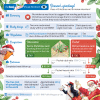Bah humbug! Association between sending Christmas cards to trial participants and trial retention: randomised study within a trial conducted simultaneously across eight host trials
- PMID: 34906985
- PMCID: PMC8669570
- DOI: 10.1136/bmj-2021-067742
Bah humbug! Association between sending Christmas cards to trial participants and trial retention: randomised study within a trial conducted simultaneously across eight host trials
Abstract
Objectives: To determine the effectiveness of sending Christmas cards to participants in randomised controlled trials to increase retention rate at follow-ups, and to explore the feasibility of doing a study within a trial (SWAT) across multiple host trials simultaneously.
Design: Randomised SWAT conducted simultaneously across eight host trials.
Setting: Eight randomised controlled trials researching various areas including surgery and smoking cessation.
Participants: 3223 trial participants who were still due at least one follow-up from their host randomised controlled trial.
Intervention: Participants were randomised (1:1, separately by each host trial) to either received a Christmas card in mid-December 2019 or to not receive a card.
Main outcome measure: Proportion of participants completing their next follow-up (retention rate) within their host randomised controlled trial.
Results: 1469 participants (age 16-94 years; 70% (n=1033) female; 96% (813/847) white ethnicity) across the eight host randomised controlled trials were involved in the analysis (cut short owing to covid-19). No evidence was found of a difference in retention rate between the two arms for any of the host trials when analysed separately or when the results were combined (85.3% (639/749) for cards versus 85.4% (615/720) for no card; odds ratio 0.96, 95% confidence interval 0.71 to 1.29; P=0.77). No difference was observed when comparing just participants who were due a follow-up in the 30 days after receiving the card (odds ratio 0.96, 0.42 to 2.21). No evidence of a difference in time to complete the questionnaire was found (hazard ratio 1.01, 95% confidence interval 0.91 to 1.13; P=0.80). These results were robust to post hoc sensitivity analyses. The cost of this intervention was £0.76 (€0.91; $1.02) per participant, and it will have a carbon footprint of approximately 140 g CO2 equivalent per card. One benefit of this approach was the need to only submit one ethics application.
Conclusions: Sending Christmas cards to participants in randomised controlled trials does not increase retention. Undertaking a SWAT within multiple randomised controlled trials at the same time is, however, possible. This approach should be used more often to build an evidence base to support selection of recruitment and retention strategies. Although no evidence of a boost to retention was found, embedding a SWAT in multiple host trials simultaneously has been shown to be possible.
Study registration: SWAT repository https://www.qub.ac.uk/sites/TheNorthernIrelandNetworkforTrialsMethodologyResearch/FileStore/Filetoupload,846275,en.pdf#search=SWAT%2082.
© Author(s) (or their employer(s)) 2019. Re-use permitted under CC BY. No commercial re-use. See rights and permissions. Published by BMJ.
Conflict of interest statement
Competing interests: All authors have completed the ICMJE uniform disclosure form at www.icmje.org/disclosure-of-interest/ and declare: funding from the MRC PROMETHEUS programme to support this work; no financial relationship with any organisation that might have an interest in the submitted work in the previous three years; no other relationships or activities that could appear to have influenced the submitted work.
Figures
Comment in
-
Retaining trial participants takes more than a Christmas card.BMJ. 2021 Dec 14;375:n2870. doi: 10.1136/bmj.n2870. BMJ. 2021. PMID: 34907001 No abstract available.
References
Publication types
MeSH terms
Grants and funding
LinkOut - more resources
Full Text Sources
Research Materials





